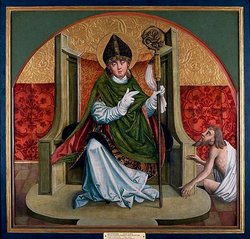Father Richard John Neuhaus’ recent book, American Babylon: Notes of a Christian Exile, which argues for a natural law approach to political and moral order, was reviewed last week by Charles R. Morris of the NY Times. Read it here.
The drama of life and death in reality
Turn, O Lord, and deliver their souls for there is none in death who will be mindful of You!
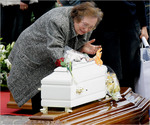 The dead from Italy’s earthquake last week are mourned. A Mass of Christian Burial was offered on Good Friday by Tarcisio Cardinal Bertone, Secretary of State to His Holiness, Pope Benedict XVI with the bishops and priests of the region.
The dead from Italy’s earthquake last week are mourned. A Mass of Christian Burial was offered on Good Friday by Tarcisio Cardinal Bertone, Secretary of State to His Holiness, Pope Benedict XVI with the bishops and priests of the region.
We beseech Thee, O Lord, deliver the souls of Thy servants, that being dead to this world, they may live to Thee and whatever sins they have committed through human frailty, do Thou wipe away by the pardon of Thy merciful goodness.
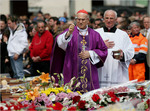 Requiem aeternam dona eis, Domine. Et lux perpetua luceat eis. Requiescant in pace. Amen.
Requiem aeternam dona eis, Domine. Et lux perpetua luceat eis. Requiescant in pace. Amen.
Easter Vespers II and the Eastertide Marian Antiphon
And it is finished…the sacred liturgies of the Easter Triduum…
And looking up they saw that the stone had been rolled back, for it was very large, alleluia.
O God, on this day through Thine only-begotten Son has overcome death and opened unto us the gate of everlasting life, do Thou follow with Thine aid the desires which Thou does put into our minds and by Thy continual help bring the same to good effect.
The Marian Antiphon concluding Compline during Eastertide is the Queen of Heaven Rejoice.
V. Queen of heaven, rejoice, alleluia:
R. For He whom you merited to bear, alleluia,
V. Has risen, as He said, alleluia.
R. Pray for us to God, alleluia..
Let us pray:
O God, who by the resurrection of Your Son, Our Lord Jesus Christ, granted joy to the whole world: grant, we beg You, that through the intercession of the Virgin Mary, His Mother, we may lay hold of the joys of eternal life. Through Christ our Lord.
Read about this prayer here; it has an interesting history.
The sacred Liturgy follows the biblical pattern of prayer: sundown to sundown. You will notice that our Jewish brothers and sisters do the same. So one’s following the liturgical life of the Church needs to remember that telling time is a bit different in that a liturgical day does not begin with sunrise to sundown. Consequently, the sacred Triduum we’ve just celebrated started with the Mass of the Lord’s Supper and ends not with the Easter Vigil on Holy Saturday but at second Vespers on Easter Sunday. This is a topic some family and friends don’t easily comprehend.
The essay “Liturgical Time and Space” in The Handbook for Liturgical Studies (in 5 vols) edited by Anscar J. Chupungco, OSB is an excellent resource for these matters liturgical.
Urbi et Orbi of Pope Benedict XVI, 2009
Dear Brothers and Sisters in Rome and throughout the world,
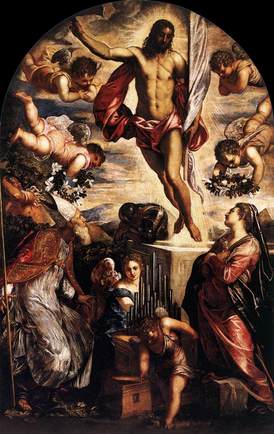 From the depths of my heart, I wish all of you a blessed Easter. To quote Saint Augustine, “Resurrectio Domini, spes nostra – the resurrection of the Lord is our hope” (Sermon 261:1). With these words, the great Bishop explained to the faithful that Jesus rose again so that we, though destined to die, should not despair, worrying that with death life is completely finished; Christ is risen to give us hope (cf. ibid.).
From the depths of my heart, I wish all of you a blessed Easter. To quote Saint Augustine, “Resurrectio Domini, spes nostra – the resurrection of the Lord is our hope” (Sermon 261:1). With these words, the great Bishop explained to the faithful that Jesus rose again so that we, though destined to die, should not despair, worrying that with death life is completely finished; Christ is risen to give us hope (cf. ibid.).
Indeed, one of the questions that most preoccupies men and women is this: what is there after death? To this mystery today’s solemnity allows us to respond that death does not have the last word, because Life will be victorious at the end. This certainty of ours is based not on simple human reasoning, but on a historical fact of faith: Jesus Christ, crucified and buried, is risen with his glorified body. Jesus is risen so that we too, believing in him, may have eternal life. This proclamation is at the heart of the Gospel message. As Saint Paul vigorously declares: “If Christ has not been raised, our preaching is in vain and your faith is in vain.” He goes on to say: “If for this life only we have hoped in Christ, we are of all men most to be pitied” (1 Cor 15:14,19). Ever since the dawn of Easter a new Spring of hope has filled the world; from that day forward our resurrection has begun, because Easter does not simply signal a moment in history, but the beginning of a new condition: Jesus is risen not because his memory remains alive in the hearts of his disciples, but because he himself lives in us, and in him we can already savour the joy of eternal life.
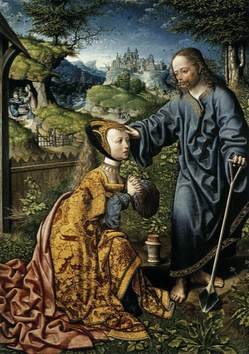 The resurrection, then, is not a theory, but a historical reality revealed by the man Jesus Christ by means of his “Passover”, his “passage”, that has opened a “new way” between heaven and earth (cf. Heb 10:20). It is neither a myth nor a dream, it is not a vision or a utopia, it is not a fairy tale, but it is a singular and unrepeatable event: Jesus of Nazareth, son of Mary, who at dusk on Friday was taken down from the Cross and buried, has victoriously left the tomb. In fact, at dawn on the first day after the Sabbath, Peter and John found the tomb empty. Mary Magdalene and the other women encountered the risen Jesus. On the way to Emmaus the two disciples recognized him at the breaking of the bread. The Risen One appeared to the Apostles that evening in the Upper Room and then to many other disciples in Galilee.
The resurrection, then, is not a theory, but a historical reality revealed by the man Jesus Christ by means of his “Passover”, his “passage”, that has opened a “new way” between heaven and earth (cf. Heb 10:20). It is neither a myth nor a dream, it is not a vision or a utopia, it is not a fairy tale, but it is a singular and unrepeatable event: Jesus of Nazareth, son of Mary, who at dusk on Friday was taken down from the Cross and buried, has victoriously left the tomb. In fact, at dawn on the first day after the Sabbath, Peter and John found the tomb empty. Mary Magdalene and the other women encountered the risen Jesus. On the way to Emmaus the two disciples recognized him at the breaking of the bread. The Risen One appeared to the Apostles that evening in the Upper Room and then to many other disciples in Galilee.
The proclamation of the Lord’s Resurrection lightens up the dark regions of the world in which we live. I am referring particularly to materialism and nihilism, to a vision of the world that is unable to move beyond what is scientifically verifiable, and retreats cheerlessly into a sense of emptiness which is thought to be the definitive destiny of human life. It is a fact that if Christ had not risen, the “emptiness” would be set to prevail. If we take away Christ and his resurrection, there is no escape for man, and every one of his hopes remains an illusion. Yet today is the day when the proclamation of the Lord’s resurrection vigorously bursts forth, and it is the answer to the recurring question of the sceptics, that we also find in the book of Ecclesiastes: “Is there a thing of which it is said, ‘See, this is new’?” (Ec 1:10). We answer, yes: on Easter morning, everything was renewed. “Mors et vita, duello conflixere mirando: dux vitae mortuus, regnat vivus – Death and life have come face to face in a tremendous duel: the Lord of life was dead, but now he lives triumphant.” This is what is new! A newness that changes the lives of those who accept it, as in the case of the saints. This, for example, is what happened to Saint Paul.
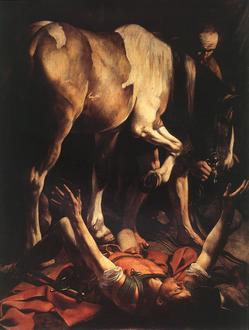 Many times, in the context of the Pauline year, we have had occasion to meditate on the experience of the great Apostle. Saul of Tarsus, the relentless persecutor of Christians, encountered the risen Christ on the road to Damascus, and was “conquered” by him. The rest we know. In Paul there occurred what he would later write about to the Christians of Corinth: “If anyone is in Christ, he is a new creation; the old has passed away, behold, the new has come” (2 Cor 5:17). Let us look at this great evangelizer, who with bold enthusiasm and apostolic zeal brought the Gospel to many different peoples in the world of that time. Let his teaching and example inspire us to go in search of the Lord Jesus. Let them encourage us to trust him, because that sense of emptiness, which tends to intoxicate humanity, has been overcome by the light and the hope that emanate from the resurrection. The words of the Psalm have truly been fulfilled: “Darkness is not darkness for you, and the night is as clear as the day” (Ps 139 [138]:12). It is no longer emptiness that envelops all things, but the loving presence of God. The very reign of death has been set free, because the Word of life has even reached the “underworld”, carried by the breath of the Spirit (v. 8).
Many times, in the context of the Pauline year, we have had occasion to meditate on the experience of the great Apostle. Saul of Tarsus, the relentless persecutor of Christians, encountered the risen Christ on the road to Damascus, and was “conquered” by him. The rest we know. In Paul there occurred what he would later write about to the Christians of Corinth: “If anyone is in Christ, he is a new creation; the old has passed away, behold, the new has come” (2 Cor 5:17). Let us look at this great evangelizer, who with bold enthusiasm and apostolic zeal brought the Gospel to many different peoples in the world of that time. Let his teaching and example inspire us to go in search of the Lord Jesus. Let them encourage us to trust him, because that sense of emptiness, which tends to intoxicate humanity, has been overcome by the light and the hope that emanate from the resurrection. The words of the Psalm have truly been fulfilled: “Darkness is not darkness for you, and the night is as clear as the day” (Ps 139 [138]:12). It is no longer emptiness that envelops all things, but the loving presence of God. The very reign of death has been set free, because the Word of life has even reached the “underworld”, carried by the breath of the Spirit (v. 8).
If it is true that death no longer has power over man and over the world, there still remain very many, in fact too many signs of its former dominion. Even if through Easter, Christ has destroyed the root of evil, he still wants the assistance of men and women in every time and place who help him to affirm his victory using his own weapons: the weapons of justice and truth, mercy, forgiveness and love. This is the message which, during my recent Apostolic Visit to Cameroon and Angola, I wanted to convey to the entire African continent, where I was welcomed with such great enthusiasm and readiness to listen. Africa suffers disproportionately from the cruel and unending conflicts, often forgotten, that are causing so much bloodshed and destruction in several of her nations, and from the growing number of her sons and daughters who fall prey to hunger, poverty and disease. I shall repeat the same message emphatically in the Holy Land, to which I shall have the joy of travelling in a few weeks from now. Reconciliation – difficult, but indispensable – is a precondition for a future of overall security and peaceful coexistence, and it can only be achieved through renewed, persevering and sincere efforts to resolve the Israeli-Palestinian conflict. My thoughts move outwards from the Holy Land to neighbouring countries, to the Middle East, to the whole world. At a time of world food shortage, of financial turmoil, of old and new forms of poverty, of disturbing climate change, of violence and deprivation which force many to leave their homelands in search of a less precarious form of existence, of the ever-present threat of terrorism, of growing fears over the future, it is urgent to rediscover grounds for hope. Let no one draw back from this peaceful battle that has been launched by Christ’s Resurrection. For as I said earlier, Christ is looking for men and women who will help him to affirm his victory using his own weapons: the weapons of justice and truth, mercy, forgiveness and love.
Resurrectio Domini, spes nostra! The resurrection of Christ is our hope! This the Church proclaims today with joy. She announces the hope that is now firm and invincible because God has raised Jesus Christ from the dead. She communicates the hope that she carries in her heart and wishes to share with all people in every place, especially where Christians suffer persecution because of their faith and their commitment to justice and peace. She invokes the hope that can call forth the courage to do good, even when it costs, especially when it costs. Today the Church sings “the day that the Lord has made”, and she summons people to joy. Today the Church calls in prayer upon Mary, Star of Hope, asking her to guide humanity towards the safe haven of salvation which is the heart of Christ, the paschal Victim, the Lamb who has “redeemed the world”, the Innocent one who has “reconciled us sinners with the Father”. To him, our victorious King, to him who is crucified and risen, we sing out with joy our Alleluia!
Love is stronger than death
![]() Christians understand: yes indeed, in the resurrection, the Son of God has emerged as the Light of the world. Christ is the great Light from which all life originates. He enables us to recognize the glory of God from one end of the earth to the other. He points out our path. He is the Lord’s day which, as it grows, is gradually spreading throughout the earth. Now, living with him and for him, we can live in the light.
Christians understand: yes indeed, in the resurrection, the Son of God has emerged as the Light of the world. Christ is the great Light from which all life originates. He enables us to recognize the glory of God from one end of the earth to the other. He points out our path. He is the Lord’s day which, as it grows, is gradually spreading throughout the earth. Now, living with him and for him, we can live in the light.
But once Christ is risen, the gravitational pull of love is stronger than that of hatred; the force of gravity of life is stronger than that of death.
(From Pope Benedict XVI’s Easter Vigil Homily, 11 April 2009)
Christ is risen!
Are there any who are devout lovers of God?
 Let them enjoy this beautiful bright festival!
Let them enjoy this beautiful bright festival!
Are there any who are grateful servants?
Let them rejoice and enter into the joy of their Lord!
Are there any weary with fasting?
Let them now receive their wages!
If any have toiled from the first hour,
let them receive their due reward;
If any have come after the third hour,
let him with gratitude join in the Feast!
And he that arrived after the sixth hour,
let him not doubt; for he too shall sustain no loss.
And if any delayed until the ninth hour,
let him not hesitate; but let him come too.
And he who arrived only at the eleventh hour,
let him not be afraid by reason of his delay.
For the Lord is gracious and receives the last even as the first.
He gives rest to him that comes at the eleventh hour,
as well as to him that toiled from the first.
To this one He gives, and upon another He bestows.
He accepts the works as He greets the endeavor.
The deed He honors and the intention He commends.
Let us all enter into the joy of the Lord!
First and last alike receive your reward;
rich and poor, rejoice together!
Sober and slothful, celebrate the day!
You that have kept the fast, and you that have not,
rejoice today for the Table is richly laden!
Feast royally on it, the calf is a fatted one.
Let no one go away hungry. Partake, all, of the cup of faith.
Enjoy all the riches of His goodness!
Let no one grieve at his poverty,
for the universal kingdom has been revealed.
Let no one mourn that he has fallen again and again;
for forgiveness has risen from the grave.
Let no one fear death, for the Death of our Savior has set us free.
 He has destroyed it by enduring it.
He has destroyed it by enduring it.
He destroyed Hell when He descended into it.
He put it into an uproar even as it tasted of His flesh.
Isaiah foretold this when he said,
“You, O Hell, have been troubled by encountering Him below.”
Hell was in an uproar because it was done away with.
It was in an uproar because it is mocked.
It was in an uproar, for it is destroyed.
It is in an uproar, for it is annihilated.
It is in an uproar, for it is now made captive.
Hell took a body, and discovered God.
It took earth, and encountered Heaven.
It took what it saw, and was overcome by what it did not see.
O death, where is thy sting?
O Hell, where is thy victory?
Christ is Risen, and you, O death, are annihilated!
Christ is Risen, and the evil ones are cast down!
Christ is Risen, and the angels rejoice!
Christ is Risen, and life is liberated!
Christ is Risen, and the tomb is emptied of its dead;
for Christ having risen from the dead,
is become the first-fruits of those who have fallen asleep.
To Him be Glory and Power forever and ever. Amen!
The Easter sermon of John Chrysostom (circa AD 400)
Exult you angels, exult you Church, exult all creation: Christ is Risen!
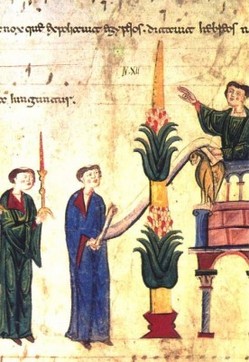 Exult now O you angelic throngs of the heavens:
Exult now O you angelic throngs of the heavens:
Exult O you divine mysteries: and let the saving trumpet resound for the victory of so great a King. Let the earthly realm also be joyful, made radiant by such flashings like lightning: and, made bright with the splendor of the eternal King, let it perceive that it has dismissed the entire world’s gloom.
Let Mother Church rejoice as well, adorned with the blazes of so great a light: and let this royal hall ring with the great voices of the peoples. Wherefore, most beloved brothers and sisters, you here present to such a wondrous brightness of this holy light, I beseech you, together with me invoke the mercy of Almighty God.
Let Him who deigned to gather me in among the number of the Levites, by no merits of mine, while pouring forth the glory of His own light enable me to bring to fullness the praise of this waxen candle.
Deacon: The Lord be with you!
Response: And with your spirit!
D: Raise your hearts on high!
R: We now have them present to the Lord!
D: Let us then give thanks to the Lord our God!
R: This is worthy and just!
Truly it is worthy and just to resound forth with the whole of the heart, disposition of mind, and by the ministry of the voice, the invisible God the Father Almighty, and His Only-begotten Son our Lord Jesus Christ, Who, on our behalf, resolved Adam’s debt to the Eternal Father and cleansed with dutiful bloodshed the bond of the ancient crime.
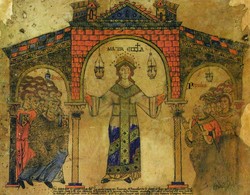 For these are the Paschal holy days, in which that true Lamb is slain, by Whose Blood the doorposts of the faithful are consecrated.
For these are the Paschal holy days, in which that true Lamb is slain, by Whose Blood the doorposts of the faithful are consecrated.
This is the night in which first of all You caused our forefathers, the children of Israel brought forth from Egypt, to pass dry shod through the Red Sea. This is the night which purged the darkness of sins by the illumination of the pillar. This is the night which today restores to grace and unites in sanctity throughout the world Christ’s believers, separated from the vices of the world and the darkness of sins. This is the night in which, once the chains of death were undone, Christ the victor arose from the nether realm. For it would have profited us nothing to have been born, unless it had been fitting for us to be redeemed.
Continue reading Exult you angels, exult you Church, exult all creation: Christ is Risen!
Saint Stanislaus, bishop & martyr
Father, to honor You, Saint Stanislaus faced martyrdom with courage. Keep us strong and loyal in our faith until death. Grant this through our Lord Jesus Christ, Your Son, who lives and reigns with You and the Holy Spirit, one God, for ever and ever.
More about Saint Stanislaus here.
Holy Saturday
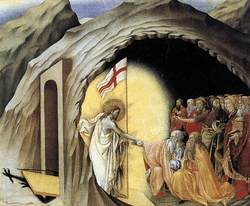 LET me tell you right now,
LET me tell you right now,
No one suffered more on Good Friday
And deserves a rest today
Than the King of the Jews-
And right now he’s in hell.
He descended into hell
Where he is right now.
And right now he is being himself,
He’s being his God-from-heaven-descended self,
And I’ll bet you that it’s a real blast in hell
With him there
And I’ll bet he’s in there
And having a ball.
He’s redeeming hell
By his sky-high dream-drawn scheme
Of simply being himself
And accepting selves’ selves
And offering himself to God-on-high for them.
A gloomy Holy Saturday: the courseness of humanity
The gloominess of today’s weather leads to a gloomy feeling that all is not well in the world. Of course, it is Holy Saturday which in itself is a bittersweet experience: the Paschal Mystery is intense and the drama of the sacred Liturgy causes me to reflect more deeply on important matters: human desire, cooperation with truth, faithfulness, interior and exterior peace, love, salvation, God, Chris’t atonement, etc.
The spiritual intensity of the day has led me to think of how some cultural commentators are looking at life through the lens of Christian faith seeing a dismal experience of Christianity and the reduction of man and woman to the courseness of existence. I am beginning to see that we are living a dark period of history. Let me give three examples that depress me, all come from today’s edition of the New York Times: “Washington Churches Eye a Prize: The Obamas,” “In Another Recession Sign, an Uptick in Vasectomies” and “Spain Steps Into Battle With Itself on Abortion.” For me, these articles show to what extent that many people are willing to go to reduce the experience of faith to a commodity, life to a matter of “rights and progressivity” and the sexual intercourse to economy and self-centeredness. All three articles strike me as examples of desperation because know of them really demonstrate to me that following Christ (or any religious sensibility) means anything. Has truth, the dignity of human life and a healthy sexuality been totally replaced by radical subjectivity, nihilism and hedonism?
The Spanish interlocutors make the claim of trying to change the current abortion law as a matter of humanity suggesting that not to change the law is to live in a barbourous society. It’s quite the opposite: you’re humanity is diminished by acting selfishly and cruelly toward the unborn. How is killing the unborn giving a woman a dignified humanity when abortion is part of the matrix? The abortion proponents argue that they want a state that is “progressive,” like other Western nations except Ireland. To what are they progressing? Death? A culture where death is the hallmark and not life.
On Holy Saturday I have to say that our society is leaping toward madness and not to great freedom and certainly not toward communion with God and life with Him.
